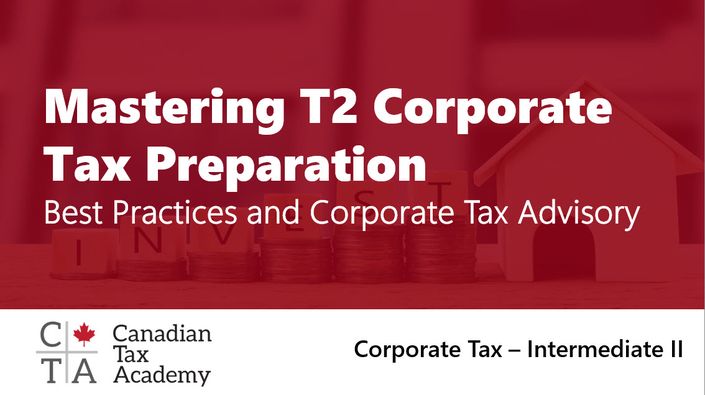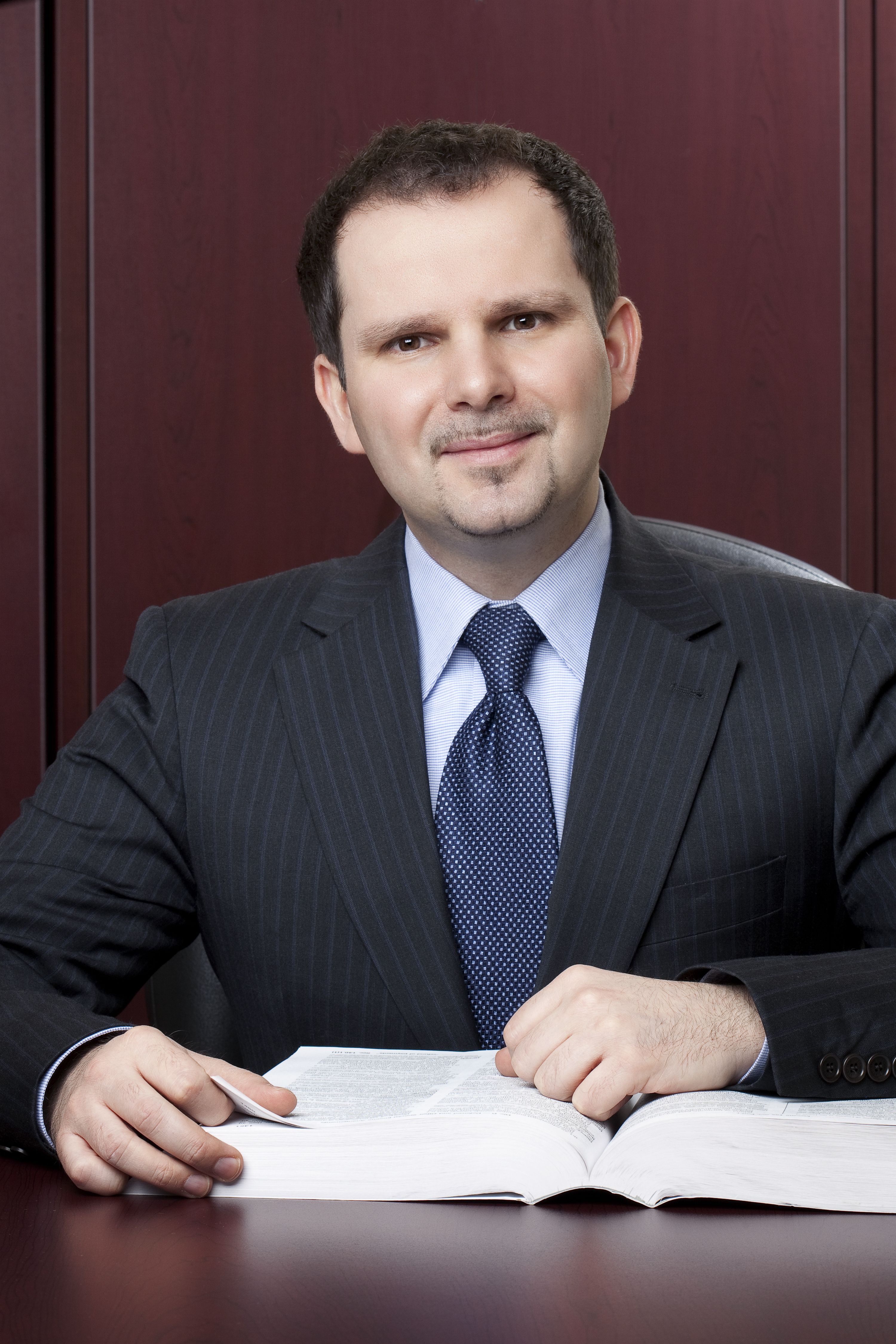
Mastering T2 Corporate Tax Preparation
Intermediate Corporate Tax - Best Practices. Roadmap for Running a Corporate Tax Practice Dealing with the Taxation of Private Enterprises and It's Shareholders
CPD HOURS FOR THIS COURSE - 15 VERIFIABLE HOURS FOR CPA CPD PURPOSES
Are you considering starting a professional tax practice and looking for a glimpse into what you can expect from clients and their tax filing requirements?
Do you want to take your career and knowledge to the next level and get a glimpse into what you can expect in running a day-to-day corporate tax and accounting practice dealing with owner-managed private corporations (i.e. small businesses)?
If so, then the Corporate Tax – Best Practices course is designed and built with you in mind. If you have taken the Introductory Corporate Tax Course here at Canadian Tax Academy, you quickly realize that you have only just scratched the surface in the area of small business corporate tax advisory and compliance services you will be asked to provide.
This course does not only deals with Corporate Tax return preparation, but focuses on a number of tax issues and planning areas related to small, owner-managed businesses. We will examine a wide breadth of critical topic areas including:
- Options and best practices on dealing with vehicles and the tax implications of owning vehicles in a corporation vs. owning them personally. All the tax various scenarios and options will be examined so that you can ensure you clients get the most from their vehicle deductions.
- Dealing and managing corporate payroll issues for both employees and owner-managers including employment expense deductions for shareholders and employees, clearing shareholder account balances using bonuses or dividends, and the dangers of paying management fees to shareholders instead of salaries or dividends.
- The traps and pitfalls inherent in shareholder benefits including the risks involved when shareholders withdraw funds from their corporations without a clear compensation strategy to deal with the amounts withdrawn and other tax trips associated with these transactions. Also examined is the scenario where a shareholder owns a property that it is rented to its corporation (a little know trap that can lead to big problems).
- Discussions on misconceptions on the frequently asked questions on paying dividends to shareholders from their corporations – Can a corporation pay a dividend if it did not have a profit in the current year? What if the corporation has negative retained earnings (i.e. a deficit)? Best practices and strategies for dealing with dividends as compensation will be reviewed
- In-depth review of the corporate tax return preparation process including areas to be aware of on certain schedules. This unit is filled with often overlooked areas and common errors made by new practitioners on corporate tax return. Once you complete this unit you will have confidence in your abilities to complete an accurate corporate tax return.
These topics alone could make up a course in itself. But, as is always the case here with Canadian Tax Academy courses, the course goes even deeper and will include a number of modules on the business side of running and managing a corporate tax practice. Once you start a corporate tax practice, you will understand that there is a lot more to it than there is with one that deals with personal tax returns alone. Also covered in this course is the following:
- Understanding the workflow and processes with corporate tax client bookkeeping and tax compliance. How to gain a solid understanding of the services you will be provided corporate clients and understanding the obligations expected of you, and what you will expect from your clients
- Building a solid and full proof communication system with all of your corporate clients that will not only keep them on track and off the CRA radar map, but also protects you from having to deal with disgruntled clients who will likely blame you for anything that goes wrong on their file
- A full unit is provided that will provide you with a blueprint or “franchise prototype” that you can apply to your practice. This unit will show you how to build and implement systems and processes that will have your practice running on cruise control. It will also provide you with some examples of what happens when you try to fly by the seat of your pants
- The course ends with a very useful module on how to document everything in your practice as a bullet-proof method for protecting yourself from mistakes, oversights, missed deadlines and, most importantly, client misunderstandings.
This course is 15 hours in length and will be yours forever. Once you purchase this course, you will have lifetime access to all the content so you can keep coming back for refreshers. Any future updates to this course will also be included. You only pay the one-time fee now and you will never be charged again, even for future updates no matter how significant they may be.
NOTE ON PREREQUISITES FOR THIS COURSE – Students who take this course should have taken the Introduction to Corporate Tax Course here at CTA or be familiar and have experience in preparing T2 tax returns for small businesses. This course will not review the basics or fundamentals of corporate tax and you will be expected to have familiarity with tax knowledge and concepts in the corporate tax landscape dealing with Private Corporations (i.e. small, owner-managed corporations).
COMPANION COURSES – While not a pre-requisite to take this course, it is highly recommended that you also consider enrolling in our Tax Practice -Risk Management course along with the Navigating Compilation Engagement Course. With this “trifecta” of courses, you will be well-positioned to deal with all aspects of running a smooth and profitable tax practice that is compliance with both tax law and professional accounting standards in the area of Compilation Engagements.
To view the entire course curriculum, just scroll down below. Be sure to click the little “down” arrow to expand the window so you can get a glimpse at all the tutorials that will be available to you in this course.
Start your journey now into the world of corporate tax for small owner-managed businesses.
Your Instructor

Ian DINovo is a professional accountant and Director of the Canadian Tax Academy. He has been practicing accounting and offering independent financial and business advice for over 20 years.
He is the creator of a number of courses dealing with business, tax and investment matters that are designed to make difficult topics easy to understand for everyone.
Course Curriculum
-
StartWelcome - Introduction to the course - How it is laid out, prerequisites and companion courses (6:07)
-
StartPrerequisites and companion courses you may want to consider along with this course (6:32)
-
StartWhat this course covers and the approach used to teach concepts (5:15)
-
StartEvergreen nature and methodology used in this course - Applies to any and all fiscal years (2:34)
-
StartAdministration - Course Payments, Refund policy, certificates of completion (6:25)
-
StartCOURSE NOTES - Course material and PowerPoint slides - Questions for this course (6:15)
-
StartUnderstanding what is involved in doing corporate work for clients (6:03)
-
StartOverview of the different ways you will be receiving year end information from clients (7:22)
-
StartUnderstanding and outlining what the corporation's obligations are - Client understanding (4:44)
-
StartAn outline of the services you should discuss with clients and who will be doing what (8:07)
-
StartPreparing a work flow plan for the client and communicating responsibilities (8:49)
-
StartKnow what you are getting into before you quote a price - understanding risk (8:18)
-
StartKnow the difference between compilations reviews and audits (5:05)
-
StartDevelop a unique template and approach to every client (7:30)
-
StartTop down approach to reviewing statements including income and expenses (5:23)
-
StartCapturing all expenses to ensure proper reporting of business expenses (6:09)
-
StartControversial CRA audit process - Asking for personal banking information (5:10)
-
StartWhat the courts had to say about this process and hoping things change (4:30)
-
StartApproach for locking down business accounts to avoid CRA expanded audits (10:41)
-
StartApproach to use when business expenses are paid personally (6:56)
-
StartThe home office expense debate for owner-managers and their corporations (3:39)
-
StartCRA guidance on corporate home office expenses - Is it much help? (8:52)
-
StartCan we issue a T2200 to the owner manager and deduct home office expenses on the T1 return? (3:25)
-
StartCRA Reviews - What does the CRA do once you file a corporate tax return (7:55)
-
StartCRA Reviews - Professional, consulting and management fees (4:38)
-
StartCRA Reviews - Repairs and maintenance expense (5:41)
-
StartCRA Reviews - Motor vehicle expenses (5:51)
-
StartReviewing a client's financial information and gross margin review before filing (5:45)
-
StartExample of a client file with a changes that would make the result more useable (9:48)
-
StartDoing a GST-HST reasonability check along with the client year end before filing (7:26)
-
StartHow to research NAICS codes using Statistics Canada and Canada Industry Statistics (5:35)
